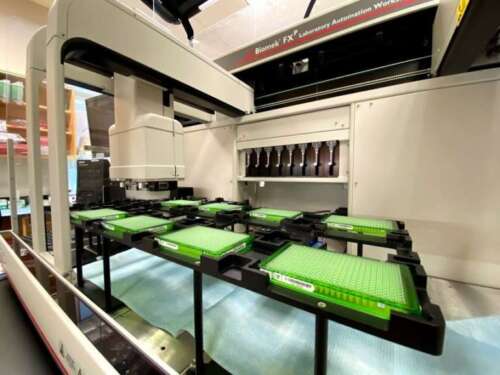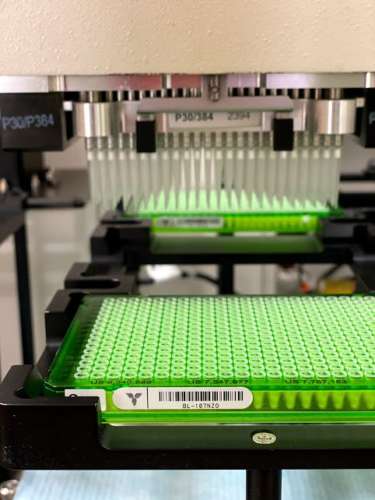
High-volume testing for the COVID-19 virus and its variants will be launched through a new partnership between Multiplex Genomics Inc. — a biotechnology company based on University of Guelph-developed research — and LifeLabs.
The collaboration will enable Multiplex Genomics to boost Ontario’s COVID-19 testing capacity by 50,000 tests per day by mid-2021.
“This new alliance will lead to unprecedented testing capacity for COVID-19 and, more importantly, for its variants that are circulating without careful tracking in the population,” said Dr. Paul Hebert, CEO of the company and director of U of G’s Centre for Biodiversity Genomics (CBG).
As of early February, Ontario will screen all positive COVID-19 cases for the B.1.1.7 variant first reported in the U.K. and known to be present in the province. Two other variants first detected in Brazil and South Africa have also appeared in other provinces.
The molecular diagnostics test is based on DNA barcoding technology first developed by Hebert that uses targeted gene sequences to distinguish between species. It is the first diagnostic test of its kind for detecting the more threatening variants of the virus.

“We have a very cost-effective, rapid test for variants of COVID-19,” said Hebert. The test focuses on the virus’s spike gene, which is especially important in increasing transmission. “By reading that section, we can both discriminate between all known variants and recognize new ones.”
Through its new alliance with LifeLabs, Canada’s largest provider of specialty laboratory testing services, Multiplex Genomics will process samples collected from across Ontario.
“LifeLabs is thrilled to partner with Multiplex Genomics,” said Charles Brown, president and CEO of LifeLabs. “This relationship combines LifeLabs’ deep operational and supply chain experience with Multiplex Genomics’ innovative diagnostic processes, allowing Canada to rapidly scale its testing capacity to meet increased demand at a time when we need it most.”
Hebert said the collaboration aims to provide test results to individuals within 24 hours of sampling. “It’s quick and simple,” he said. “Some other tests are faster, but they’re less accurate and cannot discriminate between all variants of COVID-19.”
The technology combines high-throughput sequencers with advanced liquid-handling robotics and specialized informatics platforms, allowing the partnership to process tens of thousands of samples a day. This intensive screening is critical for monitoring viral spread and for tracking the efficacy of current control measures from physical distancing to mask-wearing while Canada rolls out vaccinations, said Hebert.

Referring to the DNA barcoding of specimens collected worldwide at the CBG on campus, he said, “We have run millions of specimens for years. We know how to move lots of data in a secure way. Our system is perfectly adapted to meet the need for increased COVID testing. We couldn’t remain on the sidelines.”
Hebert said the collaboration’s variant-screening capacity will be especially important as the coronavirus “learns” to evade important as the coronavirus to evade vaccines.
“It’s absolutely critical that we devote a lot of scientific effort to understanding the variants of COVID-19. When you do that, you gather information that vaccine makers need to structure their vaccines,” he said, adding that both testing and vaccines are essential.
“This is a war being fought on many fronts. Testing is not going to win the war, but it’s going to be one of the requirements for winning it.”
Launched in summer 2020, Multiplex Genomics expects to have 60 employees working in dedicated lab space in Guelph by early March. The company received official accreditation from the Institute for Quality Management in Health Care in late January.
Beyond its role in the current pandemic, Multiplex Genomics plans to provide diagnostic medical tests for various pathogens.
Contact:
Dr. Paul Hebert
phebert@uoguelph.ca
Hannah James, Media & Strategic Communications
Centre for Biodiversity Genomics
hjames@uguelph.ca